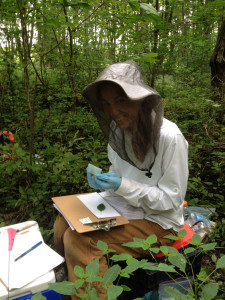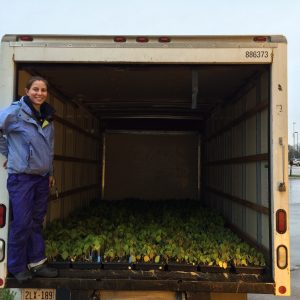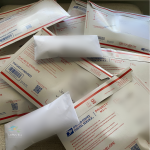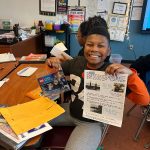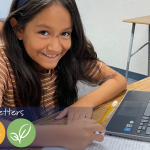It’s our first Scientist Spotlight of this school year, and we’re excited to highlight 3rd-time pen pal Rachel Toczydlowski, a PhD student at the University of Wisconsin.
I live in Madison, WI and I am a PhD student in the UW Botany Department. I am interested in how wild plant populations respond to changing environments. Currently, I am using genetic data from next-generation sequencing and data I collected from the field to study if rivers move plant genes around and help to connect otherwise isolated populations. I eat plenty of cheese, can delicious things from the garden, canoe, and scour thrift stores for cool bargains.
What does your day-to-day life as a scientist entail?
As a graduate student, my days are pretty varied, and I enjoy this. I conducted extensive fieldwork in floodplain forests and marshes in Wisconsin. These areas are unlike any other system I have worked in, and not many people spend much time exploring them. Perhaps because they are full of mosquitoes! I also work in a lab with DNA – extracting, purifying, and quantifying it. I write and run computer code on a high-throughput computing network to analyze my genetic data – 2.5 billion sequences! Other days, I do lots of reading and writing, and for four semesters, I taught Intro Biology labs for undergraduates.
What experiences did you have when you were younger that led you to become a scientist?
In grade school, I remember reading about “the scientists” with awe, and being determined to have that title one day. They were creating knowledge, and I wanted to be a part of that. I was fortunate to have passionate science teachers that taught science by making messes. We germinated seeds, incubated and hatched chicken eggs, blew up paper mache volcanoes, built and raced sleds outside, participated in the regional science fair, used DNA to solve fake crimes, dissected eyeballs, etc. Up close and personal experiences like these with scientists and the scientific method are an incredibly powerful way to foster respect and trust of scientific knowledge, regardless of the career path someone follows.
Right now, I am working with a group of social scientists to develop and administer a survey to professional foresters to understand what they think about ecosystem novelty – new conditions that we have not experienced before as a result of climate change, invasive species, etc. – and how foresters’ perceptions of novelty influence their management decisions/choices. I am also designing and teaching a public symposium at the intersection of ecology, art, and design. We are using ecosystem principles, systems thinking, and art to explore our connections to our communities – social and ecological, and to build resilience into these systems. I have always believed that scientific knowledge belongs to everyone, and I enjoy participating in projects that allow me to interact with people outside of the scientific community. I learn from them, and they learn from me, and we are all richer for it.
What has been the most fun/inspiring/educational part of having a pre-scientist pen-pal?
I have really enjoyed the challenge of applying my knowledge and experience to the things my pen pal is learning in the classroom and telling me about in their letters. That is, how can I relate what I know to what my pen pal is learning in an interesting way?
Are you a current pen pal in the program interested in being highlighted on the blog? Just fill out this form and we’ll get in touch!

